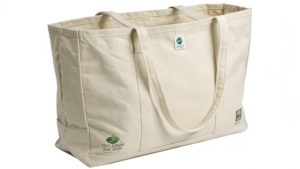Do Stainless Steel Water Bottles Rust?
Are you worried about your water bottle rusting? It is a common concern. High-quality stainless steel bottles generally do not rust.
Quality stainless steel water bottles are designed not to rust under normal use because they contain chromium, which forms a protective layer against corrosion. This makes them a durable and safe choice for daily hydration.
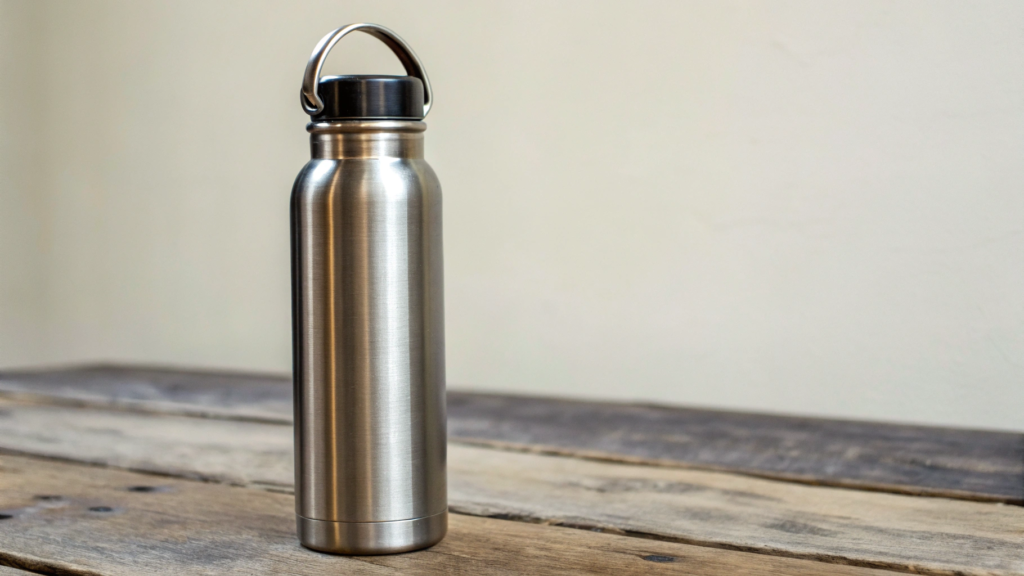
When I started Latitude, I learned that people want products they can trust. When customers ask if a stainless steel bottle will rust, they are really asking if it will last. This question goes deeper than just metal. It is about trusting the product to be safe and durable.
Can Bacteria Grow in Stainless Steel Water Bottles?
Are you concerned about germs in your water bottle? It is a valid question. Even stainless steel bottles can harbor bacteria if not cleaned properly.
Bacteria can grow in stainless steel water bottles, especially if they are not regularly washed. While stainless steel itself is non-porous and resists bacterial adhesion better than plastic, moisture and residual liquids create an environment where microbes can thrive.
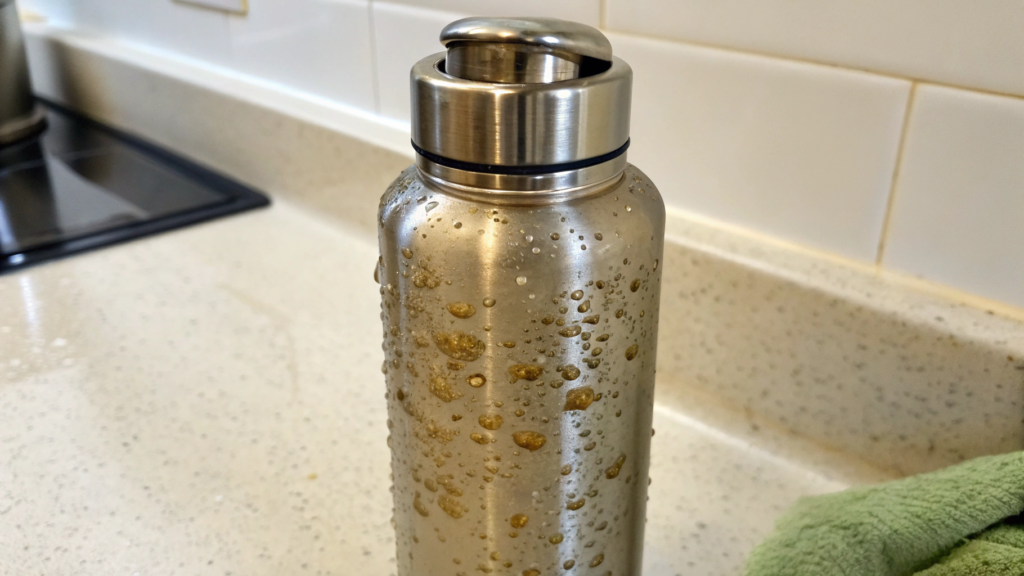
I have always told my clients that even the best materials need care. Just because a bottle does not rust does not mean it is self-cleaning. The science behind the steel is solid. Stainless steel, like 18/8 or 304 food-grade, has chromium. This reacts with oxygen to make a thin, invisible protective layer. This layer prevents rust. But this layer does not stop bacteria from growing on the inside surface if it is dirty.
Keeping Your Stainless Steel Bottle Clean
Regular cleaning is essential to prevent bacterial growth1 and ensure your stainless steel water bottle remains hygienic. Simple steps can make a big difference in maintaining its cleanliness.
| Cleaning Method | How It Works | Frequency | Benefits | Cautions |
|---|---|---|---|---|
| Daily Hand Wash | Use warm water, dish soap, and a bottle brush. | After each use. | Removes daily residue, prevents buildup. | Ensure all parts, especially the lid, are scrubbed. |
| Deep Clean (Vinegar) | Fill with equal parts white vinegar and water, soak overnight. | Weekly or bi-weekly. | Disinfects, removes odors and mineral buildup. | Rinse thoroughly to remove vinegar smell. |
| Baking Soda Paste | Mix baking soda with a little water to form a paste, scrub. | For stubborn stains or odors. | Natural abrasive, removes stains and neutralizes odors. | Rinse very well to avoid leaving any residue. |
| Bottle Brushes | Specifically designed to reach all areas inside the bottle. | Essential for all cleaning methods. | Ensures thorough scrubbing of interior surfaces. | Choose brushes with sturdy handles and effective bristles. |
| Air Drying | Leave bottle open and upside down to dry completely. | After every wash. | Prevents mold and mildew growth in damp environments. | Do not cap until fully dry. |
I often think about Jacky, my client, who is always looking for quality. A high-quality bottle means little if it is not clean. He manages tight timelines. He needs solutions that work. Regular cleaning is a simple but important solution for anyone using reusable bottles.
How Many Times Can I Reuse a Plastic Water Bottle?
Are you still reusing old plastic water bottles? It is a common habit. But it might not be the best idea for your health or the environment.
Plastic water bottles, especially single-use types, are generally not designed for repeated reuse. While you can reuse them a few times, they can degrade over time, potentially leaching chemicals into your water and becoming breeding grounds for bacteria due to scratches and wear.
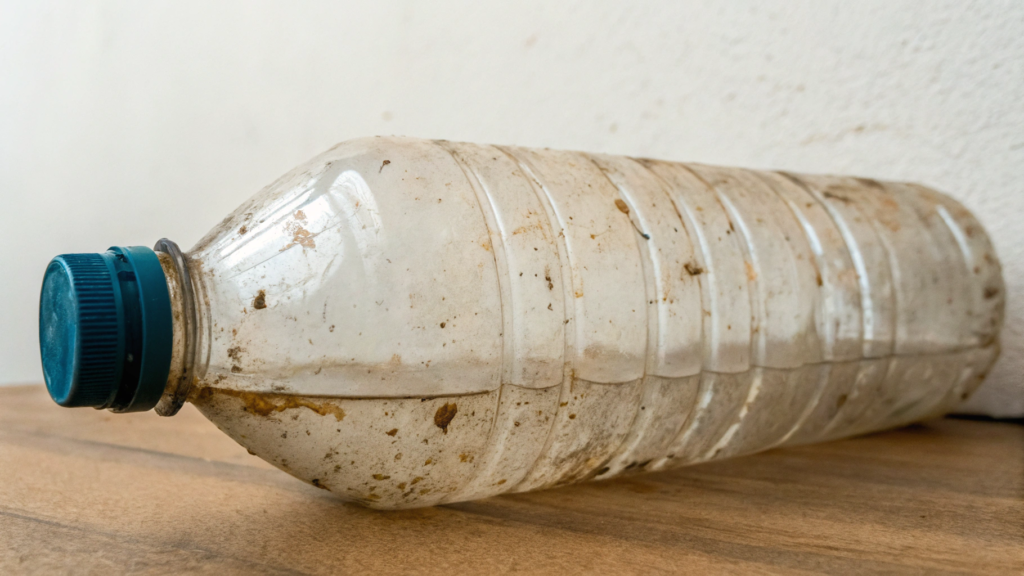
From my experience in the gifting industry, I have seen many people try to stretch the life of plastic. But not all steel is equal, and not all plastic is meant for reuse. While high-quality stainless steel resists rust, cheap plastic bottles degrade.
The Limitations of Reusing Plastic Bottles
Reusing plastic bottles, particularly those originally intended for single use, carries risks related to material degradation, chemical leaching2, and hygiene, which makes them less ideal for long-term sustainable hydration.
| Aspect | Concern | Why It Matters | Contrast with Stainless Steel |
|---|---|---|---|
| Chemical Leaching | Plastics can release chemicals like BPA or phthalates, especially when heated or scratched. | These chemicals can disrupt hormones and have other health effects. | Stainless steel (food-grade) does not leach harmful chemicals. |
| Degradation | Plastic degrades with reuse, washing, and exposure to sunlight. | Scratches and cracks create surfaces for bacteria to hide and grow. | Stainless steel is highly durable and maintains its integrity. |
| Hygiene | Difficult to clean thoroughly, leading to bacterial buildup. | Scratches in plastic trap bacteria, leading to odors and illness. | Stainless steel is non-porous and easier to clean effectively. |
| Durability | Prone to cracking, breaking, and deforming. | Leads to frequent replacement, counteracting sustainability goals. | Stainless steel is highly resistant to impacts and wear. |
| Environmental Impact | Despite reuse, frequent replacement adds to plastic waste. | Contributes to landfill burden and ocean pollution. | Stainless steel is a long-term investment, reducing waste. |
The question "Will it rust?" for a stainless steel bottle becomes a proxy for trust. For plastic, the question is "Is it still safe?" It is about buying a thoughtful tool, not just a cheap option. This makes rust resistance a test for brand integrity and product lifespan.
What Happens if You Don't Wash Your Reusable Water Bottle?
Do you sometimes forget to wash your reusable water bottle? It is easy to do. But ignoring this simple step can lead to some unpleasant surprises.
If you do not wash your reusable water bottle regularly, bacteria, mold, and even fungi can accumulate inside. Residual liquids, saliva, and warm temperatures create an ideal breeding ground, leading to unpleasant odors3, strange tastes, and potential health issues from consuming contaminated water.
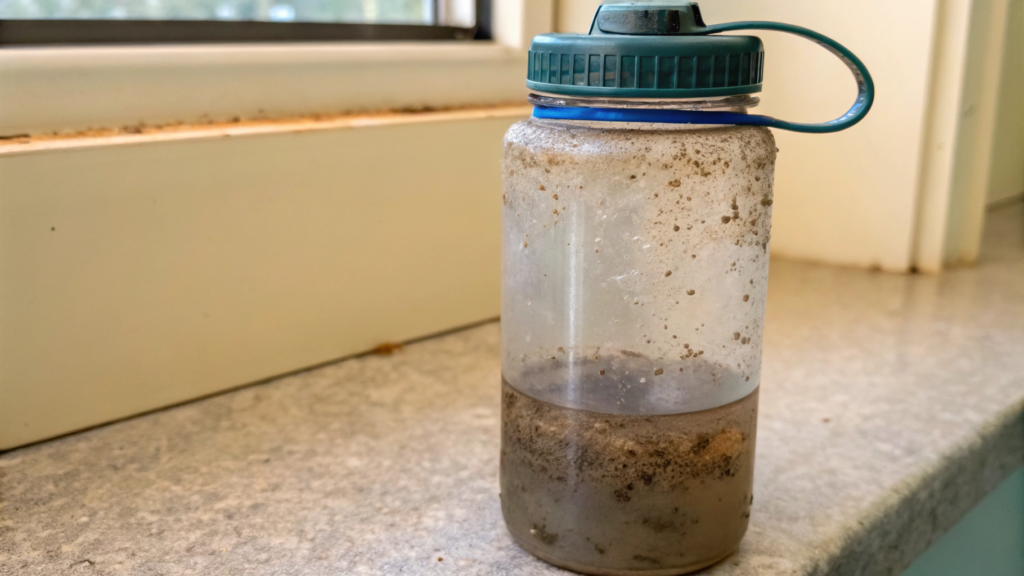
I have heard many stories about forgotten water bottles. It is never pretty. The bigger picture is about disposable culture. Rust, symbolically, means decay. When people ask if a bottle rusts, they ask if it is built to last. They ask if it will just be thrown away. Not washing a reusable bottle is like allowing it to decay, even if it is stainless steel.
The Consequences of Unwashed Bottles
Neglecting to wash your reusable water bottle can turn it from a hydration tool into a health risk, fostering environments where harmful microorganisms can thrive, regardless of the bottle's material.
| Consequence | Description | Why It Occurs | Health Implications |
|---|---|---|---|
| Bacterial Growth | Rapid multiplication of bacteria from saliva, water, and environment. | Warm, moist environment with organic matter (residual drinks). | Stomach upset, nausea, potential infections. |
| Mold and Fungi | Visible fuzzy patches or dark spots, often with musty odors. | Prolonged dampness, especially if left with liquid inside. | Respiratory issues, allergic reactions, bad taste. |
| Unpleasant Odors | Foul smells from microbial waste products. | Breakdown of organic compounds by bacteria and mold. | Makes water unappetizing, discourages hydration. |
| Altered Taste | Water tastes stale, musty, or otherwise off. | Contaminants leaching into the water, microbial byproducts. | Affects water palatability, reduces willingness to drink. |
| Biofilm Formation | A slimy layer formed by a community of microorganisms. | Microbes sticking to surfaces and growing over time. | Difficult to remove without thorough cleaning, persistent issue. |
The real value of a rust-free stainless steel bottle is peace of mind. But that peace of mind also comes from proper care. In a disposable world, choosing a durable product like a stainless steel bottle is a strong promise. Maintaining it properly extends that promise.
Conclusion
Quality stainless steel bottles resist rust, offering durability and safety. However, regular cleaning is vital to prevent bacterial growth, unlike plastic bottles which pose risks with reuse.
-
Understanding the factors that contribute to bacterial growth can help you maintain a cleaner and safer water bottle. ↩
-
Learn about the risks of chemical leaching to make informed choices about your hydration options. ↩
-
Discover effective methods to keep your water bottle fresh and odor-free, ensuring a better hydration experience. ↩



